Bottle Feeding Puppies

I have bred over 350 litters of GSDs in the 30+ years of my breeding career. Over those years, we have done our share of caring for newborns that need help. We have also come up with our own newborn puppy formula that I think is the best we have seen. You can also make this formula at home.
If you are hand-raising puppies and they develop medical problems, you will need to contact your vet. Please do not email me and ask what to do. It would be inappropriate for me to guess at the medical needs of your sick puppy.
Homemade Puppy Formula Recipe for Bottle Feeding
Ingredients
-
10 oz. of canned evaporated milk OR whole goat's milk
Do not use pasteurized cow's milk as that will cause scours. Whole goat's milk is by far the best to use. Walmart sells both evaporated milk, whole goat's milk, and evaporated goat's milk. Make sure you are using EITHER evaporated milk OR whole goat's milk. Do NOT use sweetened condensed milk! -
3 oz. sterilized water
Use baby water OR boiled water that is then cooled. This is NOT needed if using whole goat's milk. - 1 raw egg yolk
-
1 cup of plain yogurt
Avoid skim or fat-free if at all possible. -
1/2 tsp Karo corn syrup
Do NOT use honey. If you cannot find corn syrup where you live, use a simple syrup substitution instead: 1 cup of Karo can be subbed with 1 c white sugar, and 1/4 c hot water. Cook to dissolve the sugar in the water as best as you can. If you need the sugar to be completely dissolved, you might need to add a bit more water.
Directions
- Place ingredients in a blender and blend or use a wire whisk. Be careful to not over blend and create a milkshake full of bubbles. We don't want bubbles in the tube we are using to feed the puppy.
- Warm the formula to body temperature (dogs are around 101 degrees). Discard any unused formula. This is a thick mixture. Use a stomach tube to tube-feed or enlarge the hole in the bottle's nipple for easy access for the pup.
- Feed the pup in accordance to the tubing chart below.
Here are some general rules for bottle feeding puppies:
- Always boil your water before using it. Allow time to cool.
- Burp your pups after feeding.
- A pup may have little bubbles by his mouth but there should not be milk running out of his mouth.
- When the bottle is held upside down, the milk should drip out—NOT FLOW OUT. In a stream, pups can get milk in their lungs which can lead to pneumonia which can then lead to death.
- Calorie intake needs to be adjusted according to the growth of puppies. A general rule of thumb is 1 CC per ounce of body weight every 3 hours.
You must have an accurate scale to weigh pups if you are going to get the best success. Use a kitchen food scale. The ones with grams is what we use in our kennel. It is easy to see any weight gain or loss. Keep a record that you can easily refer to.
For an in-depth look at how we take care of sick puppies, view my article titled Save Your Puppy's Life.
Weight Conversion Chart for Tubing Puppies
(ounces / grams)
(daily)
(ounces / grams)
(daily)
(28.3 gm)
(594.3 gm)
(56.6 gm)
(622.6 gm)
(84.9 gm)
(650.9 gm)
(113.2 gm)
(679.2 gm)
(141.5 gm)
(707.5 gm)
(169.8 gm)
(735.8 gm)
(198.1 gm)
(764.1 gm)
(226.4 gm)
(792.4 gm)
(254.7 gm)
(820.7 gm)
(283.0 gm)
(849.0 gm)
(311.3 gm)
(877.3 gm)
(339.6 gm)
(905.6 gm)
(367.9 gm)
(933.9 gm)
(396.2 gm)
(962.2 gm)
(424.5 gm)
(990.5 gm)
(452.8 gm)
(1018.8 gm)
(481.1 gm)
(1047.1 gm)
(509.4 gm)
(1075.4 gm)
(537.7 gm)
(1103.7 gm)
(566.0 gm)
(1132.0 gm)
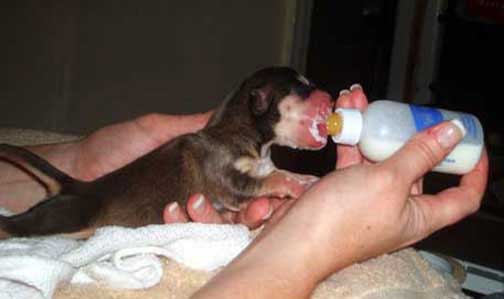
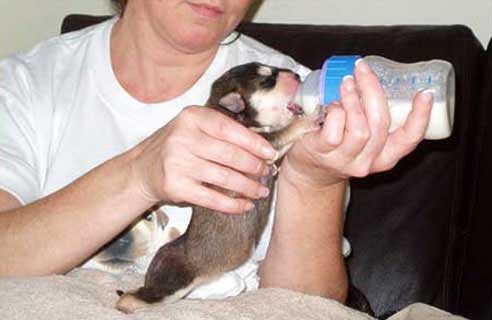
Raising Orphaned Puppies
Chilling & Hypothermia in Puppies
Newborn puppies cannot regulate their body temperature very well. They quickly become chilled, or hypothermic, if their mother, their siblings, or their environment does not keep them warm. It will be necessary to provide a heat source for your puppy for the first few weeks of life. Suitable heat sources include hot water bottles, incubators, and heat lamps. Whichever heat source you use, make sure the puppy doesn't become overheated or burned. In addition, avoid drafts by placing the puppy's box away from windows, doorways, and air-conditioning vents.
During the first 4 days of life, aim to keep the air temperature in the box at puppy-level between 85°F and 90°F. Gradually decrease the temperature to about 80°F degrees by days 7-10. If you are raising a litter of puppies, the temperature can be a little lower, as the puppies will huddle together and keep one another warm.
The normal rectal temperature for a newborn puppy is 95-99°F. If its rectal temperature is below 94°F degrees, you are dealing with a potentially life-threatening case of hypothermia. The puppy needs to be warmed immediately. Take care not to overheat the puppy or warm it too quickly; this can be fatal in a weak puppy.
Dehydration in Puppies
Newborn puppies quickly become dehydrated very quickly if they are not nursing. They can also become dehydrated if their environment is too hot and dry.
Two indicators of dehydration are loss of elasticity in the skin (the skin stays tented when gently pinched up) and decreased saliva production (the gums and tongue feel tacky or dry).
In addition to providing adequate nutrition, you may need to humidify the puppy box or whelping room if the puppy is small or weak. Be careful not to make the box too hot and humid; this can also cause respiratory distress.
A home humidifier should be adequate.
In some cases, you may have to do sub-q fluids. But that is a topic covered for another article on my website titled Save Your Puppy's Life.
Hypoglycemia in Puppies
Hypoglycemia quickly develops in a newborn that is not nursing frequently.
As hypoglycemia worsens, the puppy becomes progressively more depressed and weaker.
Without treatment, it may develop muscle twitches or seizures and then it will become unresponsive and comatose.
If it is showing any of these signs, place a few drops of corn syrup on its tongue. This simple procedure is often sufficient to revive a hypoglycemic puppy. Also watch for signs of hypoglycemia over the next several days, as you adjust your puppy's feeding schedule.
Feeding Puppies
I am not a fan of bottles made for puppies. I prefer human baby bottles.
If the pup has a good sucking reflex, try those.
Take time to check the hole in the nipple before using the bottle the first time. The hole is the right size if, when you turn the bottle upside down, milk replacer drips from the nipple with only a gentle squeeze of the bottle.
If, when you upend the bottle, you must squeeze it firmly to get milk to drip from the nipple, the hole needs to be enlarged. Otherwise, the puppy will become discouraged or exhausted when nursing and may even refuse to nurse.
To enlarge the hole, heat a needle and then pierce the tip of the nipple a few times. If the puppy is weak and has a poor suck reflex, it is necessary to feed the puppy through a tube inserted into its stomach. Your veterinarian will instruct you on how to place the tube and maintain it for feeding.
Orphaned Puppies Need Help Defecating
Mothers stimulate their puppies to defecate (pass stool) by licking or nuzzling around the puppy's anus. To prevent your orphaned puppy from becoming constipated, you'll need to mimic this action using a soft cloth or cotton ball moistened with warm water. Gently stimulate the puppy's anal area after feeding for the first 2 weeks of its life.
The Newborn Puppies
The first 36 hours of a puppy's life is the critical period nutritionally.
Healthy puppies will nurse right away and then every few hours. The pups must nurse from their mother within 12 hours of birth to receive her antibodies against disease.
After 12 hours, their stomachs will not absorb antibodies. After this first 12 hours, if the mother does not have enough milk, or if her litter is too large, then the pups' diet can be supplemented with our homemade milk replacer. Cow's milk is nutritionally inadequate for puppies.
Orphan puppies less than one week old must be stimulated to urinate and defecate. This is accomplished by gently massaging the abdomen and genital area with a piece of cotton wool or tissue, dampened with warm water.
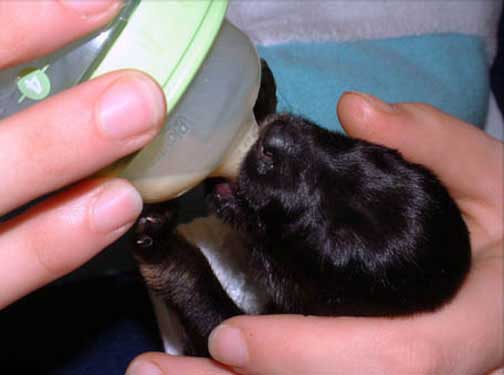
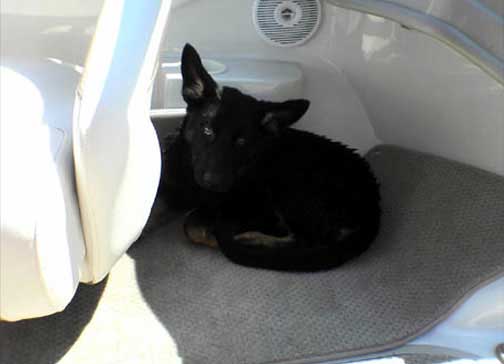
Weaning Pups
We feed our pups a raw diet. Do your pup a favor - feed a raw species appropriate diet. Educate yourself and extend the life and health of your dogs. I have written a great deal on this subject, Visit my article page.
We start to add raw hamburger to our bottle-feeding formula at about 4 to 4 1/2 weeks of age.
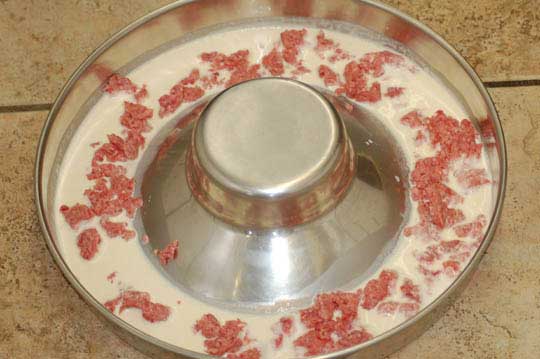
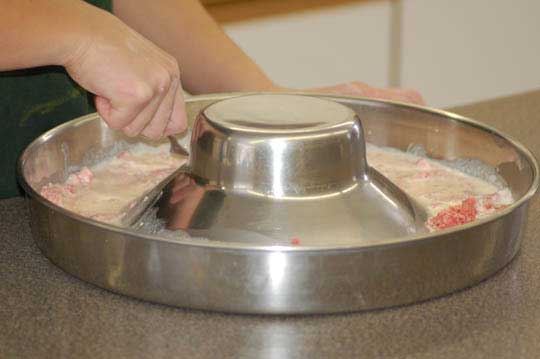
We feed a raw diet here at Leerburg. If you are considering an all-natural diet (which I believe every dog should have), take a look at our extensive Raw Diet FAQ.
Whelping Chart
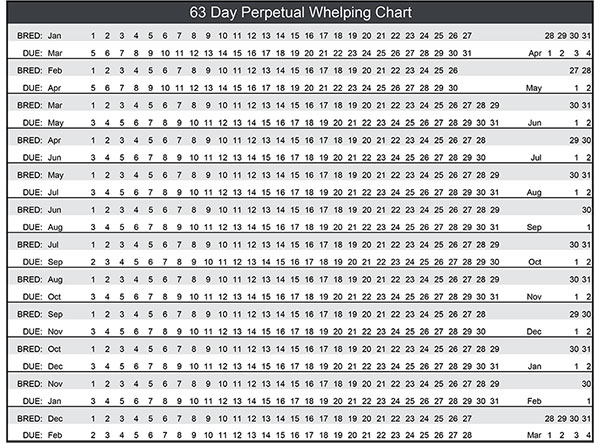





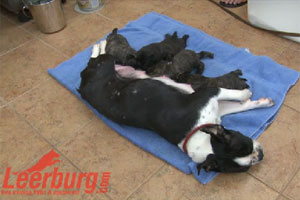
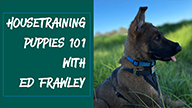
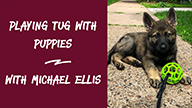
Ask Cindy.